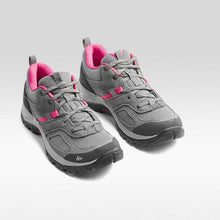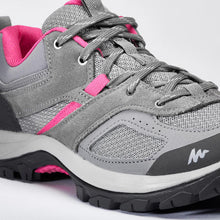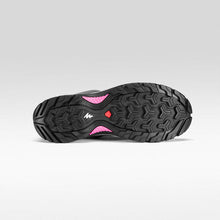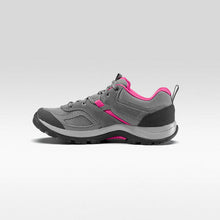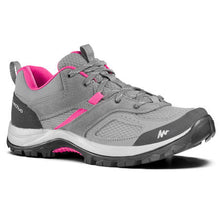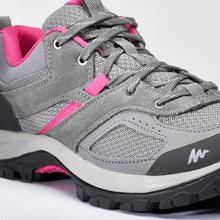
These shoes are made for occasional hikes in the mountains in dry weather.
TRACTION
Non-slip rubber outsole with 4mm gripping studs
IMPACT PROTECTION
Durable rubber stone-guard at the front of the foot to protect your toes.
CUSHIONING
Full-length cushioning thanks to an EVA midsole
LIGHTWEIGHT
295 g per shoe in size 6
WHICH HIKING FREQUENCY AND INTENSITY?
We have classified our product in terms of performance and function to suit the 3 levels of Mountain Walking:
- Occasional: a dozen hikes a year for approximately 3 to 4 hours, under 10 km and under 700m of vertical distance.
- Regular: twenty outings a year. 4 to 6 hours, 10 to 20 km, 700 to 1200m of vertical distance per outing.
- Intensive: for over 20 outings per year. For over 6 hours, over 20 km, 1200 to 2000m of vertical distance per outing.
SUSTAINABLE DEVELOPMENT INFORMATION
For the inner sole fabric coating of these shoes, we dye the thread during manufacturing to reduce the environmental impact. Textile dyeing requires a lot of water but also produces waste water from the dye baths. To reduce this environmental impact, we use a mass pigmentation process that involves adding the colour pigments when the yarn itself is produced.
SOLE WITH GRIP
The grip of our soles is certified.
To be awarded certification, the boots must pass laboratory tests to assess the grip rate on different surfaces (Smooth, Rugged, Dry, Wet). To validate these tests, we assess the quality of our soles in the field, in the mountains, by a panel of representative testers over 500 km
WHICH SIZE SHOULD I SELECT?
The most important thing is to try on several sizes and styles of boots to find the one most suited to you!
You can take a size above your usual one to prevent the toes from bumping into the toe box when going downhill, provided the foot is properly supported to avoid friction.
Tip: keep your toenails short and, before a long descent, check that your lacing is tight enough to prevent your foot from sliding forwards inside the boot.
BUYING TIPS / HOW DO YOU TRY YOUR BOOTS ON?
Some Decathlon stores have a test route.
1. Try on both shoes, standing up, with the socks worn for hiking. 2. Tighten the laces, taking care to correctly balance the tightening.
3. Check two points:
- the heel does not come up before the boot when you walk uphill.
- the foot does not slide and the toes do not press against the front when going downhill.
4. Try on several sizes and models.
Break them in gradually to adapt them to your foot.






